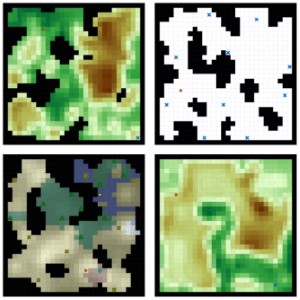Multicriteria Pathfinding in Uncertain Simulated Environments
Ph.D. Dissertation, Dept. Elect. Eng. Comp. Sci., Univ. Missouri, Columbia, MO, USA, 2018
Media
Cellular automata environment generation using region dilation.
Cellular automata environment generation using random expansion.
A greedy algorithm solving a CMM problem with no region clustering.
A greedy algorithm solving a CMM problem using region clustering with no local region memory.
A greedy algorithm solving a CMM problem using region clustering with local region memory.
A greedy algorithm solving a CMM problem using region clustering only for unobserved regions.
A greedy algorithm for solving the partially observable travelling salesman problem (PO-TSP).
A myopic Monte Carlo (MMC) algorithm for solving the partially observable travelling salesman problem (PO-TSP).
Ant Colony Optimization (ACO) for solving the TSP in the CMM framework.


